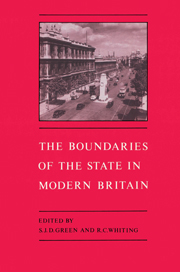Book contents
- Frontmatter
- Contents
- List of figures
- List of tables
- List of contributors
- Acknowledgements
- 1 Introduction: the shifting boundaries of the state in modern Britain
- Part I The state and political theory
- Part II The economy
- Part III Welfare and social policy
- 9 The dilemmas of welfare: Titmuss, Murray and Mead
- 10 Medicine and the English state, 1901–1948
- 11 The English state and educational theory
- Part IV Conflict and order
- Part V Religion and morality
- Index
10 - Medicine and the English state, 1901–1948
Published online by Cambridge University Press: 18 March 2010
- Frontmatter
- Contents
- List of figures
- List of tables
- List of contributors
- Acknowledgements
- 1 Introduction: the shifting boundaries of the state in modern Britain
- Part I The state and political theory
- Part II The economy
- Part III Welfare and social policy
- 9 The dilemmas of welfare: Titmuss, Murray and Mead
- 10 Medicine and the English state, 1901–1948
- 11 The English state and educational theory
- Part IV Conflict and order
- Part V Religion and morality
- Index
Summary
The connection between the health of the individual and that of the body politic was not a new insight at the turn of the twentieth century but it was one that had begun to compel political activity by the state in redrawing the boundary between the public and the private in medicine. A century before this the caricatures of Gillray, Cruikshank and Row-landson had deployed a visual metaphor in lampooning the parlous state of the political nation through depicting sick and dying patients in the care of impotent doctors. By 1904, however, the findings of the Inter-departmental Committee on Physical Deterioration had given a new political imperative to this analogy in indicating that the vigour of the imperial state depended upon the physical health and well-being of the individual citizen.
Although it has been alleged that ‘most medical histories have devoted little attention to the state’, it would be more accurate to say that attention has been focussed on the state at moments of high policy – the nineteenth-century incursion into public health, the twentieth-century inception of national health insurance (NHI) or of the national health service (NHS) – whilst intervening periods have been neglected. This chapter will concentrate on the role of interest groups, and on the contrasting impact of provider and consumer groups, in shaping the state's growing interventionism between the end of the Victorian era and the beginning of the NHS in 1948. Within this intervening period there was a transition from the belief that the private medical market was the most effective deliverer of health care to the view that it was the state that could do so more efficiently.
- Type
- Chapter
- Information
- The Boundaries of the State in Modern Britain , pp. 213 - 230Publisher: Cambridge University PressPrint publication year: 1996



